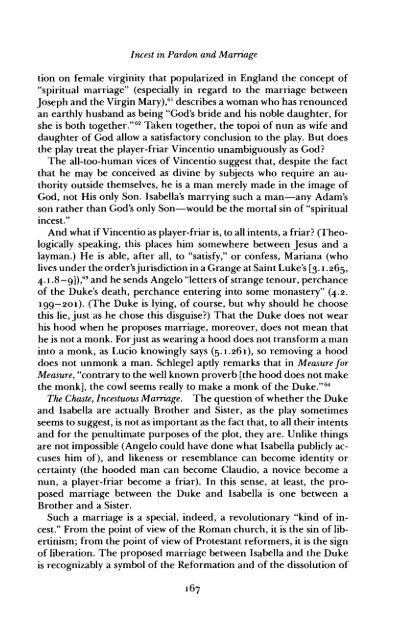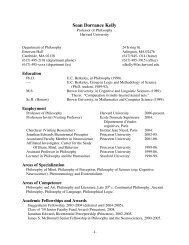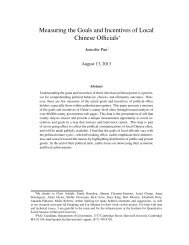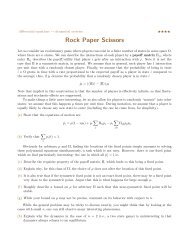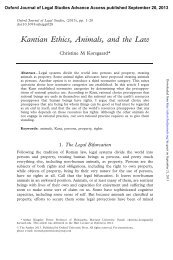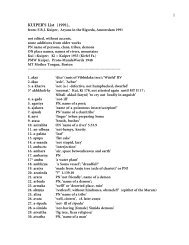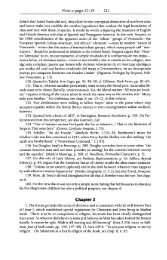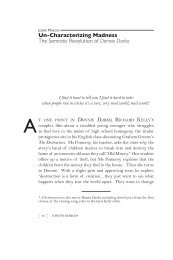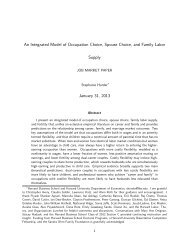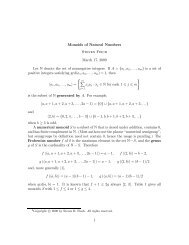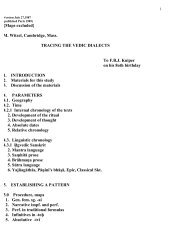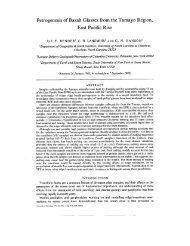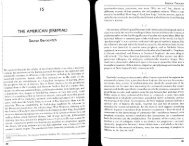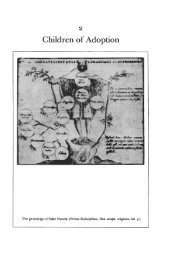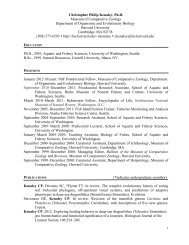Incest in Pardon and Marriage - People Fas Harvard
Incest in Pardon and Marriage - People Fas Harvard
Incest in Pardon and Marriage - People Fas Harvard
You also want an ePaper? Increase the reach of your titles
YUMPU automatically turns print PDFs into web optimized ePapers that Google loves.
<strong>Incest</strong> <strong>in</strong> <strong>Pardon</strong> <strong>and</strong> <strong>Marriage</strong><br />
tion on female virg<strong>in</strong>ity that popularized <strong>in</strong> Engl<strong>and</strong> the concept of<br />
"spiritual marriage" (especially <strong>in</strong> regard to the marriage between<br />
Joseph <strong>and</strong> the Virg<strong>in</strong> mar^),^' describes a woman who has renounced<br />
an earthly husb<strong>and</strong> as be<strong>in</strong>g "God's bride <strong>and</strong> his noble daughter, for<br />
she is both t~gether."~~ Taken together, the topoi of nun as wife <strong>and</strong><br />
daughter of God allow a satisfactory conclusion to the play. But does<br />
the play treat the player-friar V<strong>in</strong>centio unambiguously as God?<br />
The all-too-human vices of V<strong>in</strong>centio suggest that, despite the fact<br />
that he may be conceived as div<strong>in</strong>e by subjects who require an authority<br />
outside themselves, he is a man merely made <strong>in</strong> the image of<br />
God, not His only Son. Isabella's marry<strong>in</strong>g such a man-any Adam's<br />
son rather than God's only Son-would be the mortal s<strong>in</strong> of "spiritual<br />
<strong>in</strong>cest."<br />
And what if V<strong>in</strong>centio as player-friar is, to all <strong>in</strong>tents, a friar? (Theologically<br />
speak<strong>in</strong>g, this places him somewhere between Jesus <strong>and</strong> a<br />
layman.) He is able, after all, to "satisfy," or confess, Mariana (who<br />
lives under the order'sjurisdiction <strong>in</strong> a Grange at Sa<strong>in</strong>t Luke's [3.1.265,<br />
4.1.8-9])?5 <strong>and</strong> he sends Angelo "letters of strange tenour, perchance<br />
of the Duke's death, perchance enter<strong>in</strong>g <strong>in</strong>to some monastery" (4.2.<br />
199-201). (The Duke is ly<strong>in</strong>g, of course, but why should he choose<br />
this lie, just as he chose this disguise?) That the Duke does not wear<br />
his hood when he proposes marriage, moreover, does not mean that<br />
he is not a monk. For just as wear<strong>in</strong>g a hood does not transform a man<br />
<strong>in</strong>to a monk, as Lucio know<strong>in</strong>gly says (5.1.261), so remov<strong>in</strong>g a hood<br />
does not unmonk a man. Schlegel aptly remarks that <strong>in</strong> Measure for<br />
Measure, "contrary to the well known proverb [the hood does not make<br />
the monk], the cowl seems really to make a monk of the D ~ke."~<br />
The Chaste, <strong>Incest</strong>uous <strong>Marriage</strong>. The question of whether the Duke<br />
<strong>and</strong> Isabella are actually Brother <strong>and</strong> Sister, as the play sometimes<br />
seems to suggest, is not as important as the fact that, to all their <strong>in</strong>tents<br />
<strong>and</strong> for the penultimate purposes of the plot, they are. Unlike th<strong>in</strong>gs<br />
are not impossible (Angelo could have done what Isabella publicly accuses<br />
him of), <strong>and</strong> likeness or resemblance can become identity or<br />
certa<strong>in</strong>ty (the hooded man can become Claudio, a novice become a<br />
nun, a player-friar become a friar). In this sense, at least, the proposed<br />
marriage between the Duke <strong>and</strong> Isabella is one between a<br />
Brother <strong>and</strong> a Sister.<br />
Such a marriage is a special, <strong>in</strong>deed, a revolutionary "k<strong>in</strong>d of <strong>in</strong>cest."<br />
From the po<strong>in</strong>t of view of the Roman church, it is the s<strong>in</strong> of libert<strong>in</strong>ism;<br />
from the po<strong>in</strong>t of view of Protestant reformers, it is the sign<br />
of liberation. The proposed marriage between Isabella <strong>and</strong> the Duke<br />
is recognizably a symbol of the Reformation <strong>and</strong> of the dissolution of


